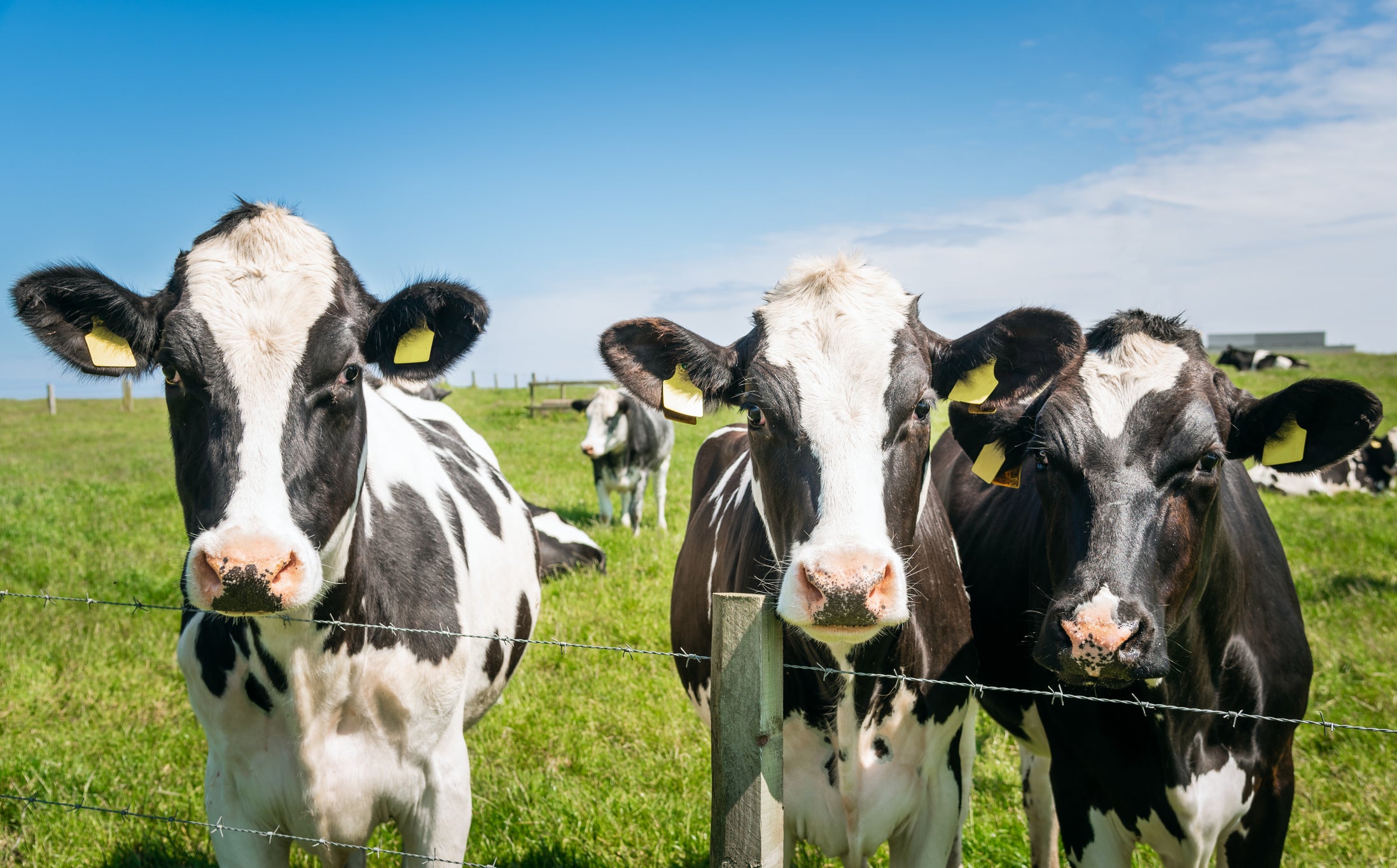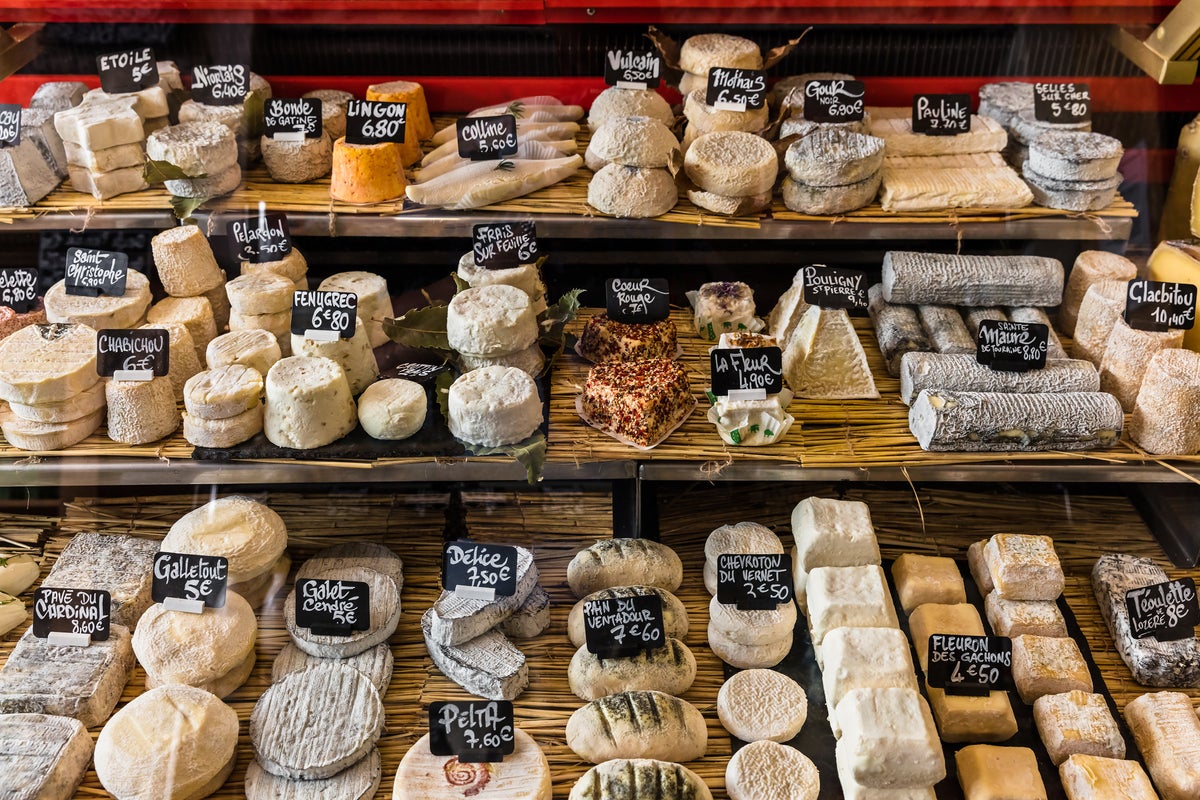First they came for our meat sandwiches. Now, they’ve come for the brie. And the burrata. And the goat’s cheese. It’s 2025 in Britain, and we’re being told that the soft, creamy wedge on our cheeseboard is suddenly a threat to national biosecurity.
According to a government note issued on 10 July, the UK has implemented a temporary ban on the commercial import of certain unpasteurised dairy products from France and Italy, following outbreaks of lumpy skin disease (LSD) in cattle. The restriction applies to products made from raw milk that were produced after 23 May 2025. Thermised milk products, which are gently heated but not fully pasteurised, are not included in the ban.
Yes, it sounds disgusting – “lumpy skin disease” conjures images of something out of a horror film. But in reality, it’s a viral condition affecting cattle, not humans. It’s spread by biting insects and causes fever, painful nodules on the skin and, in severe cases, a drop in milk production and even death. For farmers, it’s a serious and costly disease that can decimate herds. But it doesn’t survive pasteurisation – or a brie rind, for that matter – and there’s zero risk to humans from dairy products.
But while LSD poses no risk to humans and isn’t spread via dairy, the Department for Environment, Food and Rural Affairs (Defra) has insisted the measure is necessary to prevent a potential risk to UK livestock.
A spokesperson told The Independent: “This government will do whatever it takes to protect British farmers and their herds from disease,” adding that most Italian cheeses, such as parmesan, mozzarella and gorgonzola, should be unaffected as they are largely pasteurised.
Humans may be unaffected by the cattle disease, but we are feeling the impact in a different way. Restaurants and delis are reporting shortages of European cheeses, particularly those made with raw milk. Brie, mozzarella di bufala (which is unpasteurised), camembert and chevre are becoming increasingly difficult to source.
But most shoppers needn’t panic – as Sarah Stewart, director at Neal’s Yard Dairy, points out, “The majority of people in the UK buy their cheese from a supermarket, and the cheeses that they’re buying there probably aren’t affected, because they’ll be pasteurised.”
And yet, the sudden disruption has left independent cheesemongers scrambling.
“The first thing to say is that this news is coming to us only very recently,” says Matt March Smith, director at online retailer Pong Cheese. “In fact, we are finding out about the restrictions by the deliveries we’re getting from the wholesalers we use to import a lot of continental cheeses. A week or so ago, we were just being ‘shorted’ on certain items.”
For those relying on unpasteurised imports, the timing couldn’t be worse. Summer is peak picnic and cheeseboard season. March Smith explains that some stock remains unaffected because it was produced before the 23 May cutoff.
But even so, there’s nervousness in the industry about what’s ahead. “While this is an ongoing situation, and of course we hope it’s resolved really soon, those young, raw-milk superstar cheeses from France are our bestsellers, and in many ways represent the best that the cheese world offers, by way of taste, and texture, and of course heritage,” he says.
At Borough Market, one of the country’s most important food destinations and a hub for artisan cheese, the mood is cautious but concerned.
“There is still availability of some of these cheeses, because a number of them have been thermised, but there are some products which you cannot thermise and so we do have some supply gaps,” says Shane Holland, chair of the charitable trust that operates the market. “It’s not like there are suddenly no Italian or French cheeses. That’s not the case. But we are very concerned about how long this ban is going to last.” He says previous bans have lasted up to a year, and there’s been very little government support.

open image in gallery
Lumpy skin disease affects cattle, not humans – but it’s British livestock that policymakers say they’re protecting (Getty/iStock)
Some cheesemongers are working around the restrictions by shifting their focus. March Smith says his company has responded by spotlighting products that fall outside the scope of the ban – turning its attention to longer-aged cheeses and safer, pasteurised alternatives that can fill the gap left by raw-milk imports.
“Because we’re an internet company, we can be very reactive to stock availability and change the prominence of products immediately when things like this happen,” he explains. “We’ve therefore focused on promoting products [including] more mature cheeses such as comte, pasteurised versions of the classics – eg epoisses, bleu d’Auvergne, taleggio – as well as Spanish, German and Swiss alternatives.
“Of course, we always have a fantastic range of British cheeses that are readily available alternatives, such as golden cenarth (like an epoisses), tunworth (like a camembert), and cheeses like bix, which is particularly French in style.”
Still, the rationale behind the ban is raising eyebrows. The real question isn’t whether cheese is dangerous – it’s whether this is about safety at all. Is this a reflection of genuine risk, or of a post-Brexit bureaucracy that’s become too risk-averse to think rationally? Lumpy skin disease, while serious for cattle, cannot be transmitted to humans. Nor can it be passed from finished dairy products to animals.
It’s not like you would go and buy an exquisite French brie and then leave it in a cattle field for a cow to eat. That’s not going to happen. So even if there was a hypothetical, theoretical risk – I would dispute whether there’s even that
Shane Holland, Borough Market
“The bigger question is, what is the ban for?” Holland says. “We completely understand restricting the movement of live cattle. [LSD] is an infectious disease from cattle to cattle. But if we’re talking about from cattle to milk, there’s no cattle-to-human transmission at all. Even if there was the tiniest risk, it’s not being consumed by cattle anyway.”
In other words, there’s little plausible route of infection – not to people, and certainly not to livestock.
He points out that in France and Italy, cheeses from affected areas are still being consumed legally in unaffected regions. That, he argues, is effectively the same as importing them into the UK. “We find that slightly confusing. We’re talking about banning the import of a product which is consumed by humans, from which there is no impact on humans at all.
“And it’s not like you would go and buy an exquisite French brie and then leave it in a cattle field for a cow to eat. That’s not going to happen. So even if there was a hypothetical, theoretical risk – I would dispute whether there’s even that.”
While thermised versions of cheeses – those made from milk that is gently heated but not fully pasteurised – are still compliant, they aren’t a perfect substitute. And not all cheeses can be thermised. “Where there are gaps on the shelves – and there are a small number – we do obviously have British counterparts,” Holland says. “And we’d encourage people to buy those as well. But we also need to keep supporting our French and Italian producers. If we suddenly stop buying anything from them, then ultimately, what is it that they’ve got left to sell?”
Jose Bueno, cheese buyer at Brindisa, a Spanish goods distributor, has so far been spared any direct impact. “We’ve been lucky so far, as the ban hasn’t been extended to Spain,” he says. “We continue to monitor the situation in case that changes.” But he remembers a similar outbreak in Castilla-La Mancha that forced producers to pasteurise in order to continue exporting to the UK. In cases where pasteurisation wasn’t possible, imports stopped altogether until restrictions were lifted.
What’s also troubling is the apparent lack of communication. Importers weren’t pre-warned or briefed on the new restrictions – many only realised something had changed when deliveries started arriving short.
If this were about disease control, wouldn’t someone have picked up the phone? “I’m sure there was a lot of chaos at the borders when the ban was brought in,” adds Stewart, “because often when those things happen, nobody’s exactly sure what’s involved. And then only as things become clearer, people can make plans.”

open image in gallery
Baron Bigod is flying the flag for British soft cheese – but can it fill the gap left by its French cousin? (Fen Farm Dairy)
While Spain remains outside the current restrictions, Bueno warns of a larger threat. “We continue to face challenges with paperwork and customs procedures stemming from Brexit,” he says. “These have significantly increased our costs and strained certain relationships, particularly with smaller suppliers who can’t afford the added expenses or manage the increasingly demanding conditions.”
His concern is that if restrictions of this kind were extended further, it could reshape the entire food landscape. “Ultimately, we could be left with a food landscape dominated by large corporations, as they’re often the only ones able to navigate and absorb the costs of complex import/export requirements.”
No one disputes the need to protect British herds. But as the industry braces for what could become a year-long ban, there’s growing concern that we’ve gone too far. That the government, in its effort to guard against a theoretical threat, has created a very real one.
Still, all is not lost. As Stewart points out, people have been seeking out British equivalents to French and Italian cheeses since long before they began to disappear.
“If somebody’s after a camembert, we’ll be able to offer them tunworth or St Jude. If they’re after a brie, we’ll be able to offer them baron bigod. And then, with some of the more washed rinds, we’ve got equivalents like Yarlington and St Cera.”
But you might want to savour that burrata while you can. It’s becoming harder to come by – and it’s getting harder to justify why.
